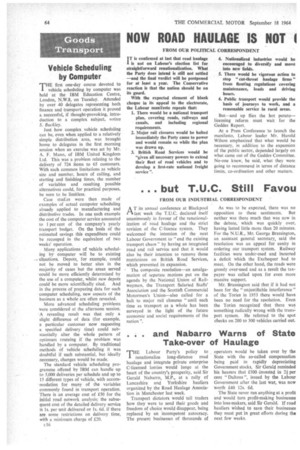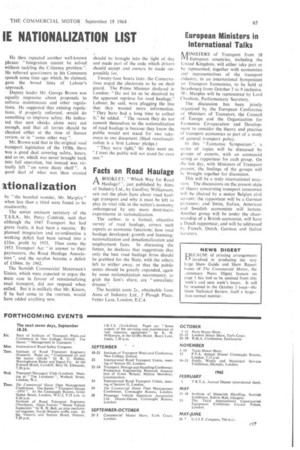. but T.U.C. Still Favou itionalization
Page 66

Page 67

If you've noticed an error in this article please click here to report it so we can fix it.
FROM OUR INDUSTRIAL CORRESPONDENT
A T its annual conference at Blackpool last week the T.U.C. declared itself unanimously in favour of the renationalization of road haulage and the strict revision of the C-licence system. They welcomed the intention of the next Labour Government to "end the existing transport chaos" by having an integrated road and rail service and that it would also be their intention to remove those restrictions on British Road Services, which prevented its expansion.
• The composite resolution—an amalgamation of separate motions put on the agenda by the National Union of Railwaymen, the Transport Salaried Staffs' Association and the Scottisll Commercial Motormen's Union—also called for a halt to major rail closures "until such time as transport as a whole has been surveyed in the light of the future economic and social requirements of the nation ".
As was to be expected, there was no opposition to these sentiments. But neither was there much that was new in the debate, which was quickly over. having lasted little more than 20 minutes. For the N.U.R., Mr. George Brassington, an assistant general secretary, said the resolution was an appeal for sanity in ordering our transport system. Railway facilities were under-used and incurred a deficit which the Exchequer had to meet. On the other hand, the roads were grossly over-used and as a result the taxpayer was called upon for even more massive support.
Mr. Brassington said that if it had not been for the "unjustifiable interference" of the Tories in 1953 there would have been no need for the resolution. Even the Tories recognized that there was something radically wrong with the transport system. He referred to the spot checks on 200 to 300 vehicles carried out. by "the bearded wonder, Mr. Marples " when less than a third were found to be roadworthy.
The senior assistant secretary of the T.S.S.A., Mr. Percy Coldrick, said that although the 1947 Transport Act had grave faults, it had been a success. By planned integration and co-ordination a working deficit had been turned into a £33m. profit by 1953, Then came the 1953 Transport Act "in answer to their paymasters, the Road Haulage Association ", and the surplus became a deficit of £104m. by 1962.
The Scottish Commercial Motormen's Union, which were expected to argue the main case in favour of renationalizing road transport, did not respond when called. But it is unlikely that Mr. Kitson, if he had come to the rostrum, would have added anything new.


































































































































































































































































